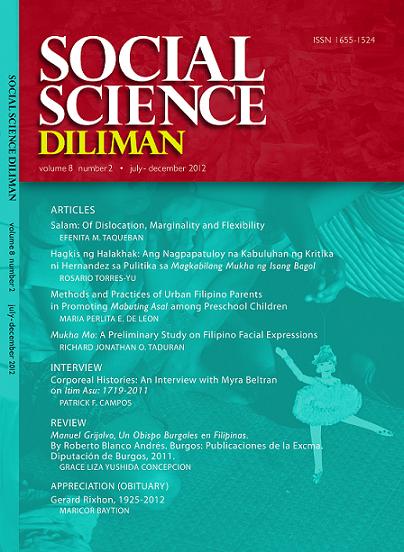Methods and Practices of Urban Filipino Parents in Promoting Mabuting Asal among Preschool Children
Abstract
This paper is a portion of an ethnographic study conducted in an urbanizing community in Valenzuela City. The study aimed to investigate and discuss the concepts and practices that parents have in promoting mabuting asal or positive social behavior among their preschool children. The participantswere 15 two-parent families with at least two children, one of whom was between ages 3 and 6 years. Seven of the participating families were dualearner while the rest were single-earner. They were visited at home for at leastan hour twice a week for a period of six months. Afterwards, face-to-face interviews were conducted with the parents in each family. Results suggested that the methods that parents use to promote mabuting asal among the young ones can be categorized into three – physical, verbal, and cognitivetypes. Mothers in both income groups used the physical and cognitive types, although single-earner families would use physical methods more often than cognitive ones. On the other hand, fathers in both income groups would useverbal methods more, possibly as a result of their compensating behavior for their own experiences of harsh and coercive upbringing as young children. The study recommends comprehensive, integrative, sensitive, and flexible child-rearing seminars for parents as well as health and day care workers in the community. In terms of methodology, conducting the research in several localities, across different social groups, with a larger sample could provideanother perspective to the relationships between variables utilized in this research.
How to Cite
DE LEON, Maria Perlita E..
Methods and Practices of Urban Filipino Parents in Promoting Mabuting Asal among Preschool Children.
Social Science Diliman: A Philippine Journal of Society and Change, [S.l.], v. 8, n. 2, mar. 2013.
ISSN 2012-0796.
Available at: <https://www.journals.upd.edu.ph/index.php/socialsciencediliman/article/view/3604>. Date accessed: 09 sep. 2025.
Issue
Section
Articles
Keywords
parenting, child-rearing, prosocial behaviors, preschool children, socialization


